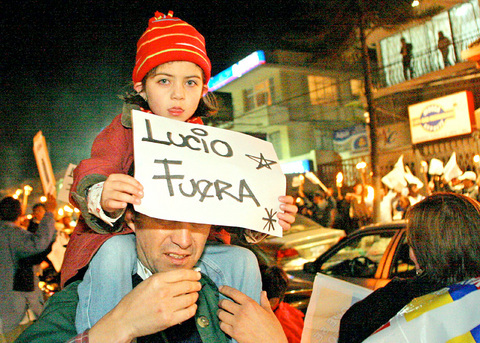Facing growing street protests demanding his ouster, President Lucio Gutierrez declared a state of emergency in the capital and dissolved the Supreme Court in an effort to resolve an escalating political crisis.
The state of emergency placed the military in charge of maintaining public order. Gutierrez, with the military high command standing behind him, announced in a televised address to the nation Friday night that under the authority provided by the Constitution, he was dismissing "the judges of the current Supreme Court designated by Congress" in December.
"The measure ... was taken because Congress until now has not resolved the matter of the current Supreme Court, which is generating national commotion and especially in the city of Quito ... which rejects the operation of the Supreme Court."

PHOTO: AFP
A state of emergency suspends individual rights, including the right to free expression and public assembly, and allows police to enter private homes without the need for search warrants. The government noted in a news release that previous governments have made use of states of emergencies frequently. It gave as an example President Sixto Duran-Ballen's 1992-1996 administration, which declared states of emergencies on 12 occasions.
Quito residents did not heed the restriction on public assembly, and within two hours of the presidential announcement, tens of thousands of people poured into the streets.
Gutierrez's political foes were quick to condemn his action.
"One stupid act is not cured by another stupid act" said Jaime Nebot, a leader of the opposition Social Christian Party who is mayor of the coastal city of Guayaquil. "All conscientious and decent Ecuadoreans want the bastard court to go, but it cannot be done by a dictatorial and illegitimate act of the president."
Quito Mayor Paco Moncayo, a retired army general and a leader of the opposition Democratic Left party, joined in condemning the measure and criticized the military high command for supporting Gutierrez's actions.
"The president can't dissolve the court. We are living in a dictatorship and this decree unmasks the dictatorship," he said. "We are calling for civil disobedience."
There was little turnout earlier this week when Gutierrez's political opponents called a giant demonstration against his purge of the Supreme Court.
But street protests began Wednesday night and increased in numbers until at least 10,000 people marched Friday night in several sections of Quito, banging pots and sticks and shouting "Get out, Lucio!"
The street protests were in response to the impromptu battle cry of a local radio station to join a nocturnal pot-banging caravan.
"We want to restore dignity and tell all of the political leaders that they are not on the same level as the people," Paco Velasco, director of the Luna radio station, told listeners Friday.
The court crisis was set in motion in November when the former justices sided with opposition politicians in a failed effort to impeach Gutierrez on corruption charges.

A fire caused by a burst gas pipe yesterday spread to several homes and sent a fireball soaring into the sky outside Malaysia’s largest city, injuring more than 100 people. The towering inferno near a gas station in Putra Heights outside Kuala Lumpur was visible for kilometers and lasted for several hours. It happened during a public holiday as Muslims, who are the majority in Malaysia, celebrate the second day of Eid al-Fitr. National oil company Petronas said the fire started at one of its gas pipelines at 8:10am and the affected pipeline was later isolated. Disaster management officials said shutting the

US Vice President J.D. Vance on Friday accused Denmark of not having done enough to protect Greenland, when he visited the strategically placed and resource-rich Danish territory coveted by US President Donald Trump. Vance made his comment during a trip to the Pituffik Space Base in northwestern Greenland, a visit viewed by Copenhagen and Nuuk as a provocation. “Our message to Denmark is very simple: You have not done a good job by the people of Greenland,” Vance told a news conference. “You have under-invested in the people of Greenland, and you have under-invested in the security architecture of this

UNREST: The authorities in Turkey arrested 13 Turkish journalists in five days, deported a BBC correspondent and on Thursday arrested a reporter from Sweden Waving flags and chanting slogans, many hundreds of thousands of anti-government demonstrators on Saturday rallied in Istanbul, Turkey, in defence of democracy after the arrest of Istanbul Mayor Ekrem Imamoglu which sparked Turkey’s worst street unrest in more than a decade. Under a cloudless blue sky, vast crowds gathered in Maltepe on the Asian side of Turkey’s biggest city on the eve of the Eid al-Fitr celebration which started yesterday, marking the end of Ramadan. Ozgur Ozel, chairman of the main opposition Republican People’s Party (CHP), which organized the rally, said there were 2.2 million people in the crowd, but

JOINT EFFORTS: The three countries have been strengthening an alliance and pressing efforts to bolster deterrence against Beijing’s assertiveness in the South China Sea The US, Japan and the Philippines on Friday staged joint naval drills to boost crisis readiness off a disputed South China Sea shoal as a Chinese military ship kept watch from a distance. The Chinese frigate attempted to get closer to the waters, where the warships and aircraft from the three allied countries were undertaking maneuvers off the Scarborough Shoal — also known as Huangyan Island (黃岩島) and claimed by Taiwan and China — in an unsettling moment but it was warned by a Philippine frigate by radio and kept away. “There was a time when they attempted to maneuver